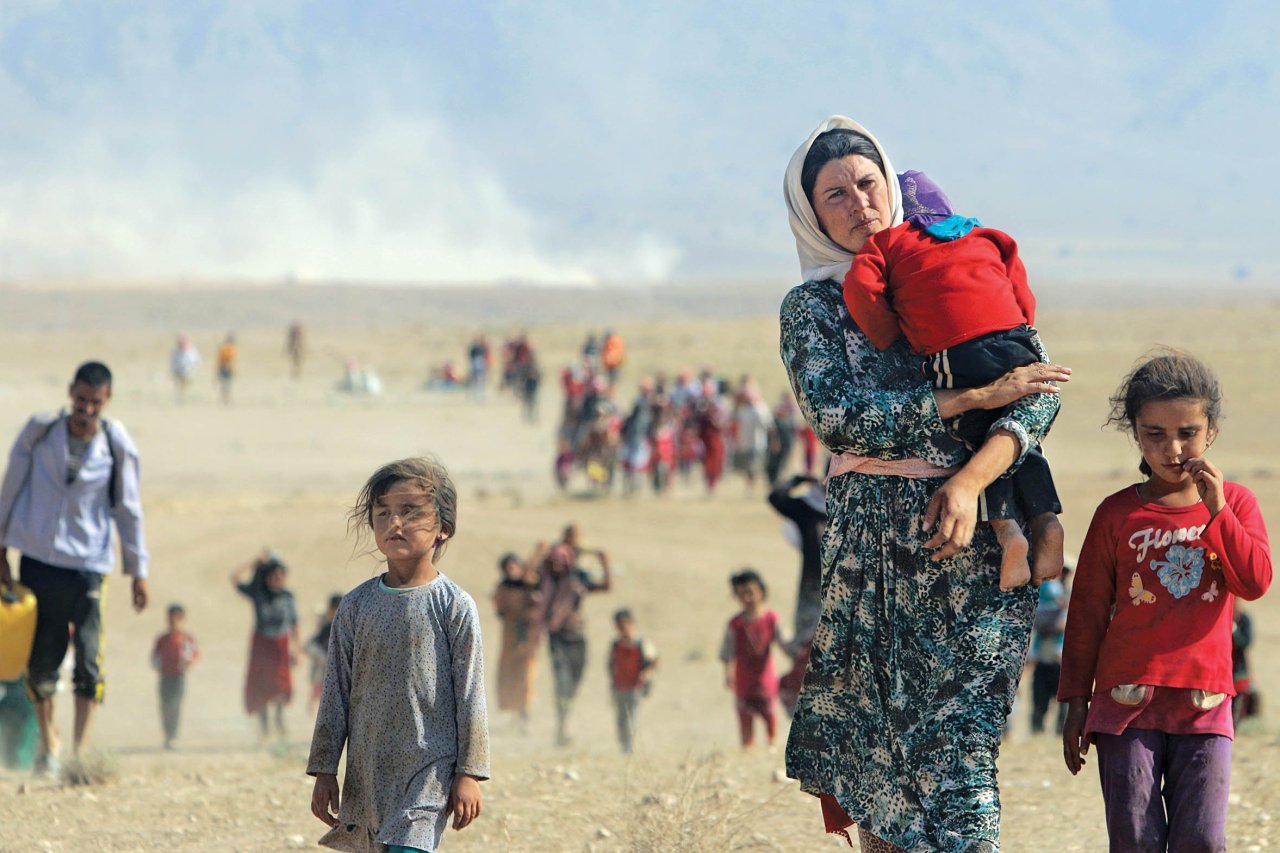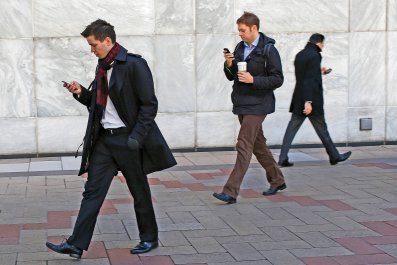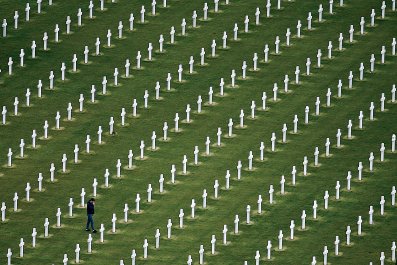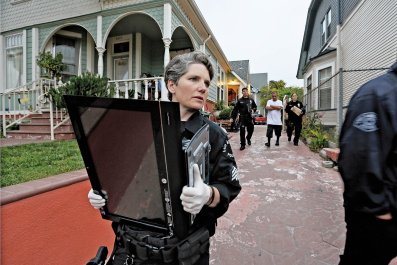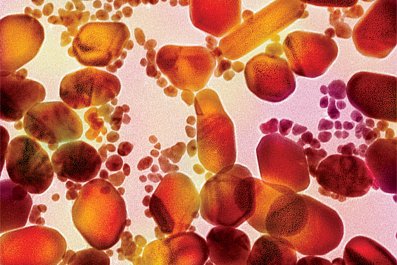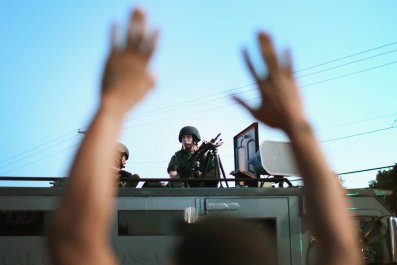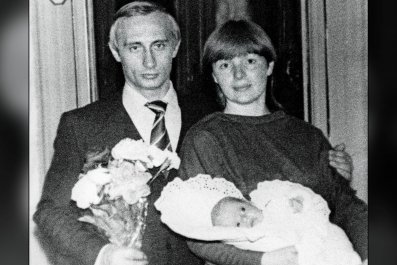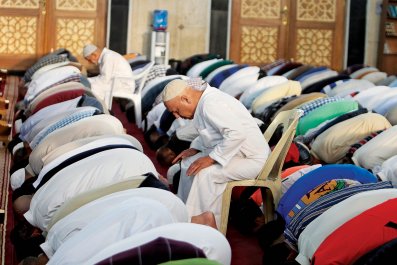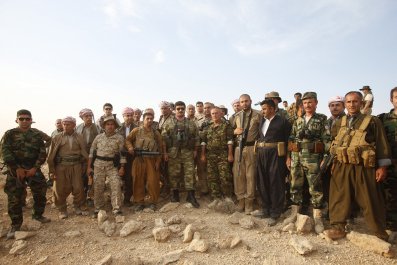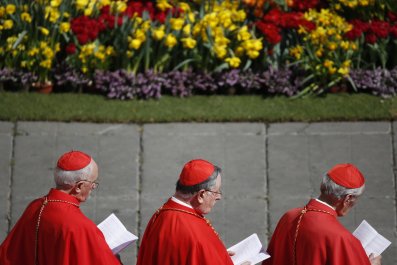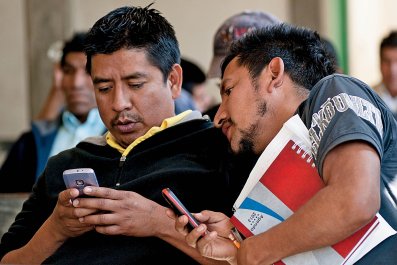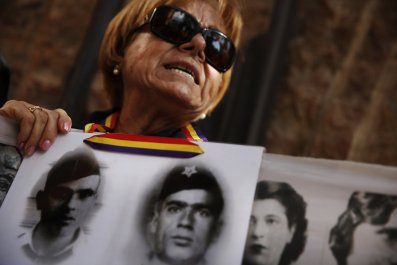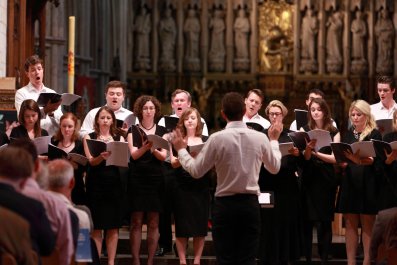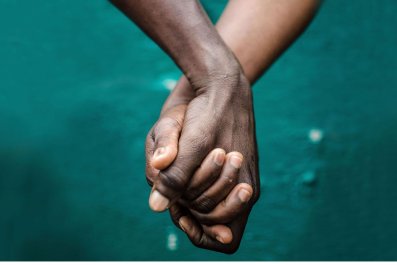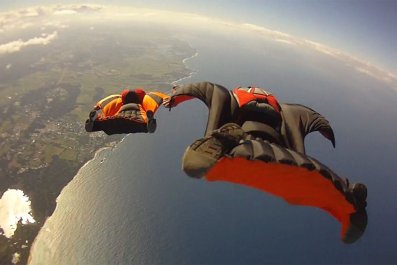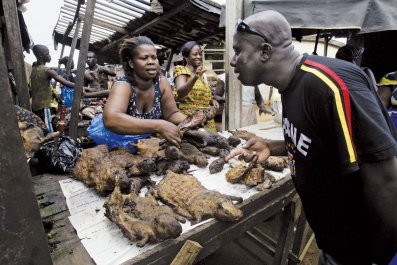In his former life in Mosul, Iraq, before he was driven out by the radical jihadists of the Islamic State, Khudeid Da Khalas, 49, had the grand title of "official representative of the Yazidi people."
Then he had to flee his home and seek refuge on the rock-strewn slopes of Mount Sinjar. "On the way, I knew that, as an official, I had to help my people," he tells Newsweek. For a few desperate days on Sinjar, he became the unofficial mayor of Death Mountain.
"We saw terrible, terrible things before we got here," said Khalas, the father of two daughters, trying not to cry. "We saw many children who died. We saw women who killed themselves so that they did not have to convert to Islam under ISIS. They were also afraid of being raped."
The Islamist fighters gave the Yazidis a choice: convert to Islam or face death. "I know that 45 Yazidi women took their own lives rather than be forced to change their religion," Khalas says. His description of life on Sinjar was disturbing. He said his people cowered on the mountainside for protection, but had no food or water. They suffered extreme heat in the day and subzero temperatures at night. There was no shelter of any sort.
On Wednesday, August 13, Khalas arrived in Kurdistan's Dohuk governorate. Along with thousands of other Yazidis and Christians, he finally left the mountain to save himself and his family. They traveled on foot, although in the final part of the journey, they piled into a local Kurd's truck.
President Barack Obama said on Thursday, August 14, that a U.S. forces operation in northern Iraq helped "break a siege" and rescued tens of thousands of displaced people.
In the past few days, the U.S. has mounted a number of humanitarian aid drops, as well as air strikes to counter Islamic State (IS) militants (formerly known as ISIS)
Obama said that the siege of Mount Sinjar is over.
"The Yazidis who remain are in better condition than previously believed and continue to have access to the food and water that we have dropped," Pentagon spokesman Rear Admiral John Kirby said.
The United Nations high commissioner for refugees (UNHCR) confirmed that around 80,000 people have so far managed to reach the safety of Dohuk.
Many arrived in a severe state of shock: Most were suffering from sunstroke and dehydration. "Temperatures on the mountain reached close to [100 degrees Fahrenheit]," says Ariane Rummery, a spokeswoman for the UNHCR. "And the ones who arrived after the walk were in terrible states—blisters, exhaustion from walking."
But these internally displaced people who are now sheltering in schools and public buildings in Dohuk are the luckier ones. "We arrived here together," Khalas says. "But there are still people on the mountain—please don't forget about them."
The U.N. does not have an estimate for the number left on Mount Sinjar. "It's a fluid situation," says Rummery. "But the number on the mountain is going down."
Still traumatized by the terrifying events that drove his people to abandon their homes, their jobs and their lives, Khalas says he has seen "the death of too many children."
Once the Yazidis had walked to the Syrian border, "we piled into transport [trucks] to get to Dohuk," he says, his voice breaking. "There were so many people in the vans that you could not take a breath. When we arrived, the dead bodies [of the children] were mixed with the living. They died because they could not breathe."
On August 13, as the U.N. describe the plight of refugees in northern Iraq as their "highest level of emergency," people began leaving the inhospitable mountain and making the long trek to Dohuk.
"They are taking different routes to flee once they leave the mountain," Rummery said. "Pretty much everyone is leaving the mountain, walking down, although a few were rescued by Iraqi helicopters. They are then crossing into Syria. The ones who walked say it took hours. They arrived covered in blisters. Some walked 10 to 12 hours some days. It's hard to get the exact distance.
"The majority of the people are then going back into Iraq," she says. "But there are around 10,000 to 15,000 that are staying in a camp inside Syria, in Newroz, [a camp] near Qamishli. This is the Kurdish Syrian area."
Khalas says conditions on the mountain were "extreme." But he is quick to say that local people, compassionate for their plight, brought them food and water. "They were generous. The local people helped us," he says. "They did not ask if we were Christians or Muslims—they just wanted to save people."
Even though he is now off the mountain, Khalas is wary of the future. He knows Dohuk will not be his final destination. But he is doubtful the Yazidi can ever return to their former life in Mosul. "The problem is, Where will we go?" he says. "We are not planning to move at the moment. But eventually, we will have to go [somewhere]."
Rummery says it is too early to think about permanent resettlement of the Yazidis "At this time our focus is on the emergency operation and giving aid to people where they are in safe places where they've found refuge," she says.
For the moment, most of the Yazidis are safely off Mount Sinjar. But what will happen to them in the long term? What they want is to feel safe and be able to practice their religion and ancient way of life in peace.
Both France and Australia have indicated they will be taking in more persecuted minorities, but there has been no indication yet from Britain in terms of offering asylum. France took 11 members of an Iraqi Christian family earlier this month and Australia has also indicated it is prepared to take 4,000.
Archbishop of Canterbury Justin Welby has been outspoken on the "particularly savage" persecution of the Yazidis. "What is happening right now in northern Iraq is off the scale of human horror," he said. "I believe that, like France, the United Kingdom's doors should be open to refugees, as they have been throughout history."
The Yazidis are an ancient people who have long been persecuted. They settled in the area around Sinjar in the 12th century, near the mountain that was believed to be where Noah's ark rested after the flood.
In December 2002, shortly before the U.S. and allied invasion of Iraq, I spent time with them in Bashiqa, a village 30 miles from Mosul, while they prayed for the war to be halted. I attended their funerals, weddings and prayer ceremonies where they prostrated themselves before their god, asking for a reprieve from another conflict.
Their religion is a blend of paganism, Zoroastrianism, Christianity and Islam. Whereas Christians believe Lucifer fell from grace to hell, the Yazidis believe he was pardoned and reinstated as the angel closest to God.
What struck me as extraordinary was their isolation from modern life. Aside from the advent of electricity, a few televisions and a few battered Chevrolets, much was the same in their olive-grove villages since ancient times. I was told only about 750 Yazidis were left in Iraq, with small pockets in Syria and Turkey. They marry among themselves to keep their bloodlines pure, do not accept converts, and have managed to pass centuries in remote mountain hamlets relatively undisturbed.
Over the course of the week, I was shown the Yazidis rituals. I was told by one of their elders, Sheikh Sulaman, that Yazidis worship the Peacock Angel, Malak Taus—or Satan. He told me their main religious text, Meshaf i Resh or the Black Book, doesn't allow them to eat lettuce or butter beans, wear dark blue, wash alone in the bath or urinate standing up (this includes men). They cannot put on underclothes while sitting down or utter the word Malak Taus, or any other similar-sounding word.
The oddity of these rituals has been lost in time—no one seemed to know why the traditions were passed on—other than that they had been told to do so by their ancestors.
What is now remarkable is how this religious minority, which for thousands of years has remained isolated and remote from the rest of civilization, has managed to get President Obama to make a conspicuous U-turn on his foreign policy.



